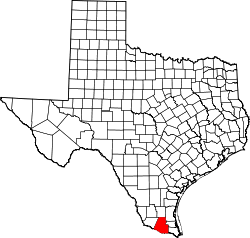Palmhurst, Texas
| Palmhurst, Texas | |
|---|---|
| City | |
| City of Palmhurst | |
|
Location of Palmhurst, Texas | |
 | |
| Coordinates: 26°15′3″N 98°18′27″W / 26.25083°N 98.30750°WCoordinates: 26°15′3″N 98°18′27″W / 26.25083°N 98.30750°W | |
| Country |
|
| State |
|
| County |
|
| Area | |
| • Total | 6.1 sq mi (15.7 km2) |
| • Land | 6.1 sq mi (15.7 km2) |
| • Water | 0.0 sq mi (0.0 km2) |
| Elevation | 161 ft (49 m) |
| Population (2010) | |
| • Total | 2,607 |
| • Density | 804.0/sq mi (310.4/km2) |
| Time zone | Central (CST) (UTC-6) |
| • Summer (DST) | CDT (UTC-5) |
| ZIP code | 78573 |
| Area code(s) | 956 |
| FIPS code | 48-54780[1] |
| GNIS feature ID | 1378825[2] |
| Website |
cityofpalmhursttx |
Palmhurst is a city in Hidalgo County, Texas. The population was 2,607 at the 2010 United States Census. It is part of the McAllen–Edinburg–Mission and Reynosa–McAllen metropolitan areas.
History
The community was incorporated in 1966.
Geography
Palmhurst is located at 26°15′3″N 98°18′27″W / 26.25083°N 98.30750°W (26.250924, -98.307607).[3]
According to the United States Census Bureau, the city has a total area of 6.1 square miles (16 km2), all land. The elevation is 170 feet above sea level.
Palmhurst is four miles north of Mission on state highway 107 and is west of McAllen. It is several miles north of the Rio Grande, the international border with Mexico.
Demographics
| Historical population | |||
|---|---|---|---|
| Census | Pop. | %± | |
| 1970 | 120 | — | |
| 1980 | 364 | 203.3% | |
| 1990 | 326 | −10.4% | |
| 2000 | 4,872 | 1,394.5% | |
| 2010 | 2,607 | −46.5% | |
| Est. 2016 | 2,718 | [4] | 4.3% |
As of the census[1] of 2000, there were 4,872 people, 1,226 households, and 1,110 families residing in the city. The population density was 804.0 people per square mile (310.4/km²). There were 1,739 housing units at an average density of 287.0 per square mile (110.8/km²). The racial makeup of the city was 84.67% White, 0.25% African American, 0.25% Native American, 0.39% Asian, 13.71% from other races, and 0.74% from two or more races. Hispanic or Latino of any race were 87.48% of the population.
There were 1,226 households out of which 60.3% had children under the age of 18 living with them, 76.2% were married couples living together, 11.7% had a female householder with no husband present, and 9.4% were non-families. 7.3% of all households were made up of individuals and 2.0% had someone living alone who was 65 years of age or older. The average household size was 3.97 and the average family size was 4.18.
In the city, the population was spread out with 38.9% under the age of 18, 10.1% from 18 to 24, 29.5% from 25 to 44, 16.8% from 45 to 64, and 4.7% who were 65 years of age or older. The median age was 26 years. For every 100 females there were 94.0 males. For every 100 females age 18 and over, there were 89.9 males.
The median income for a household in the city was $22,847, and the median income for a family was $24,549. Males had a median income of $27,500 versus $21,833 for females. The per capita income for the city was $11,275. About 35.6% of families and 37.9% of the population were below the poverty line, including 48.6% of those under age 18 and 20.4% of those age 65 or over.
However, over the past decade, the city lost nearly half its population as many low-income families in small homes moved out and were replaced by a smaller number of upscale residents. According to Onboard Informatics, by 2013 the median household income in Palmhurst had risen to $77,491, making it one of the wealthiest communities in South Texas. The demographics of Palmhurst have changed dramatically since 2000, as shown on the city-data.com website.
Education
About half of Palmhurst is served by the Mission Consolidated Independent School District. The other half is served by the Sharyland Independent School District.
In addition, South Texas Independent School District operates magnet schools that serve the community.
References
- 1 2 "American FactFinder". United States Census Bureau. Retrieved 2008-01-31.
- ↑ "US Board on Geographic Names". United States Geological Survey. 2007-10-25. Retrieved 2008-01-31.
- ↑ "US Gazetteer files: 2010, 2000, and 1990". United States Census Bureau. 2011-02-12. Retrieved 2011-04-23.
- ↑ "Population and Housing Unit Estimates". Retrieved June 9, 2017.
- ↑ "Census of Population and Housing". Census.gov. Retrieved June 4, 2015.
